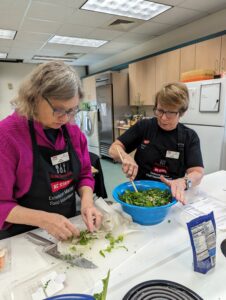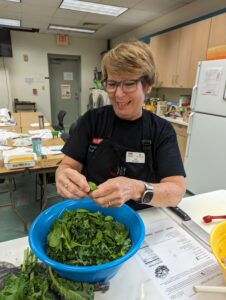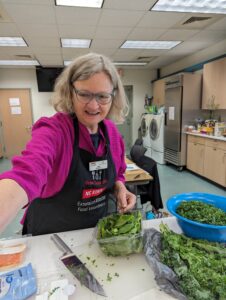Start Off With a Med Salad
go.ncsu.edu/readext?976662
en Español / em Português
El inglés es el idioma de control de esta página. En la medida en que haya algún conflicto entre la traducción al inglés y la traducción, el inglés prevalece.
Al hacer clic en el enlace de traducción se activa un servicio de traducción gratuito para convertir la página al español. Al igual que con cualquier traducción por Internet, la conversión no es sensible al contexto y puede que no traduzca el texto en su significado original. NC State Extension no garantiza la exactitud del texto traducido. Por favor, tenga en cuenta que algunas aplicaciones y/o servicios pueden no funcionar como se espera cuando se traducen.
Português
Inglês é o idioma de controle desta página. Na medida que haja algum conflito entre o texto original em Inglês e a tradução, o Inglês prevalece.
Ao clicar no link de tradução, um serviço gratuito de tradução será ativado para converter a página para o Português. Como em qualquer tradução pela internet, a conversão não é sensivel ao contexto e pode não ocorrer a tradução para o significado orginal. O serviço de Extensão da Carolina do Norte (NC State Extension) não garante a exatidão do texto traduzido. Por favor, observe que algumas funções ou serviços podem não funcionar como esperado após a tradução.
English
English is the controlling language of this page. To the extent there is any conflict between the English text and the translation, English controls.
Clicking on the translation link activates a free translation service to convert the page to Spanish. As with any Internet translation, the conversion is not context-sensitive and may not translate the text to its original meaning. NC State Extension does not guarantee the accuracy of the translated text. Please note that some applications and/or services may not function as expected when translated.
Collapse ▲If you’re looking for a more healthful way of eating as you start the new year, consider the Mediterranean Diet. This involves eating the traditional way people who live in the Mediterranean region do.
Eating a Mediterranean-based diet can help protect you from developing chronic
illnesses such as some forms of cancer, decrease the risk of type 2 diabetes and
managing blood pressure. Eating “the Med way” can reduce the risk of cardiovascular disease, improve eye health and protects against cognitive decline. The Mediterranean diet is also more effective than a low-fat diet for weight loss in overweight and obese individuals.
N.C. Cooperative Extension Service and NC State University has developed program that called Med Instead of Meds. This program focuses learning to eat a Mediterranean diet. The name of the program comes from the concept that eating the Mediterranean way can help you eat well and reduce your need for medications for blood pressure, high cholesterol and diabetes.
Avery Ashley, our Family and Consumer Science Extension Agent, here in Brunswick County will be offering a series of in-person classes based on this Med Instead of Meds curriculum. at the Rourke Library in Shallotte. These classes will be held February 12,19, 26 and March 4 from 10:30 a.m. until noon each day. They’re calling the classes Med Not Meds. You can register at the Rourke Library in Shallotte or on the library’s website. Seating is limited.
If you want to get a head start on these classes, you can visit the Med Instead of Meds website. They offer a series of videos that take you through the six basic concepts of the Mediterranean diet. These include eating foods you may think as too high in fat or unhealthy, including nuts, olive oil, olives and how grains. The website shares how these foods can be part of a healthy diet along with fruits, vegetables, seafood and whole grains. There are also many great recipes that can help you incorporate these concepts into your everyday eating.

EMFV Jane Kulesza (left) from Oak Island and Lori Van Horn from Ocean Isle Beach combine the ingredients for the salad.
In anticipation of these upcoming classes, our Extension Master Food Volunteers were recently in the Extension Demonstration kitchen in Bolivia testing recipes to be demonstrated and sampled in these classes.
One of these recipes is a simple salad that is creamy, crunchy and packed with flavor. It’s a Kale Arugula and Farro salad. Kale gives this salad hearty bulk while the arugula provides a light peppery flavor to the background. Farro, an ancient grain with a slightly nutty and chewy texture, provides the salad with a contrast of texture and filling whole grains. If you don’t know about farro or can’t find it at the store you could use any whole grain here-
–such as brown rice, quinoa or barley. Creamy feta and crunchy almonds round out the salad to perfection. Top with a simple, homemade Citrus Salad Dressing to bring all the flavors together. It was a winner!
Kale Arugula and Farro Salad
- 2 cups cooked farro
- 1 bunch kale (packaged baby kale will work, too)
- 1 box (5 ounces) arugula
- 1/2 cup sliced almonds, toasted
- 3 ounces feta cheese, crumbled
Citrus Salad Dressing
- 3 lemons, juiced
- 6 tablespoons olive oil
- Salt and pepper to taste
Directions
1. Cook farro according to package directions to yield 2 cups of cooked grain.
2. Once cooked, chill farro.
3. Wash and remove ribs from kale.
4. Chiffonade kale into small strips.
5. Combine the farro, kale, and arugula.
6. Dress with Citrus Salad Dressing.
7. Top with almonds and feta.
This recipe makes 8 servings. Nutrition Information: 190 calories per serving. This
includes 15 grams of fat, 11 grams carbohydrate, 2 grams dietary fiber with 0 grams
added sugar.
Source: Med Instead of Meds, medinsteadofmeds.com
Syracuse is a Family and Consumer Science team member and can be reached at NC Cooperative Extension, Brunswick County Center 910-253-2610 or by email at
Cheryle_Syracuse@ncsu.edu





